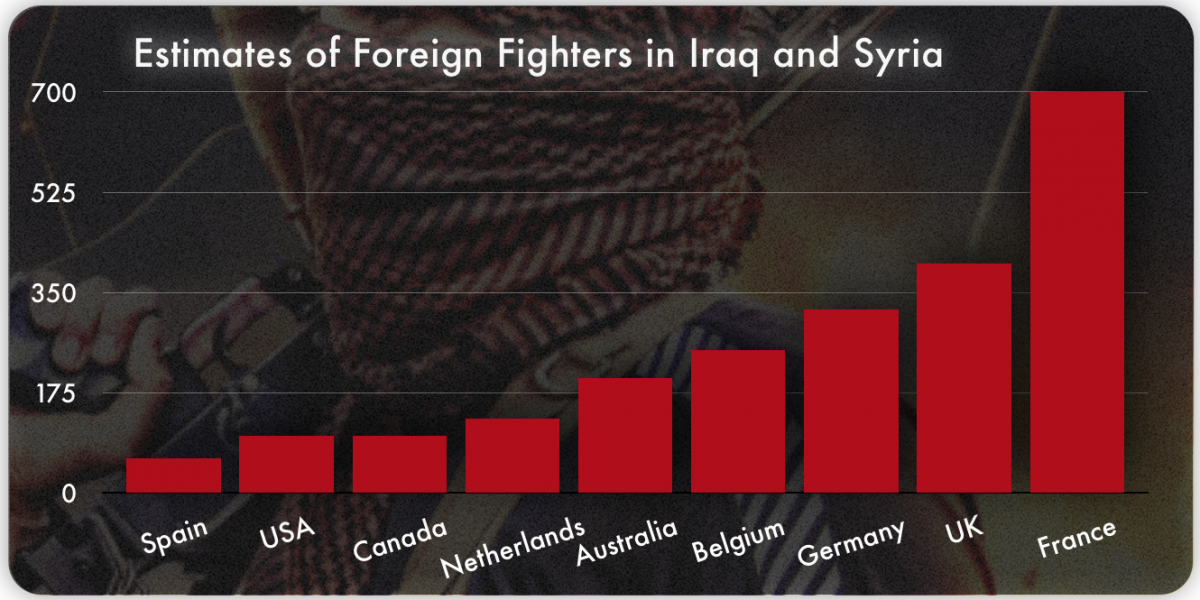The Rise Of ISIS Part 2: What Captivates People Into Joining The Islamic State?
After discussing about ISIS' terrifying climb and the ruthless manner in which the Islamic State has conquered a sizable part of Syria and Iraq in "The Rise Of ISIS Part 1", we now shed light on what makes ISIS tempting to new recruits, tempting enough to vow allegiance to this extremist group.
By now, the Islamic State (still commonly referred to by its old name ISIS) has conquered large swaths of Syria and Iraq. In doing so, it has effectively erased the border between Iraq and Syria as part of its stated goal of bringing about a new Islamic Caliphate.
As Jesse Singal writes for nymag, part of the reason ISIS has made such shocking progress toward this far-fetched goal is the enthusiasm with which would-be Jihadists from all around the world are flocking to the group to fight in Syria and Iraq
A member loyal to the Islamic State in Iraq and the Levant (ISIL) waves an ISIL flag in Raqqa June 29, 2014. The offshoot of al Qaeda which has captured swathes of territory in Iraq and Syria has declared itself an Islamic "Caliphate" and called on factions worldwide to pledge their allegiance, a statement posted on jihadist websites said on Sunday. The group, previously known as the Islamic State in Iraq and the Levant (ISIL), also known as ISIS, has renamed itself "Islamic State" and proclaimed its leader Abu Bakr al-Baghadi as "Caliph" - the head of the state, the statement said.
Image via ibtimes.comEven as the world expressed its horror at the beheadings of American journalists James Foley and Steven Sotloff by the radical militant group the Islamic State of Iraq and Greater Syria (ISIS), there were those who exulted on social media.
Self-proclaimed Western jihadists and ISIS supporters in Syria, these people proclaimed victory and promised more killings to come. “I wish I did it,” noted one on a Tumblr blog. Another asked for links to any videos of Foley’s execution and cackled, in a slang-filled Twitter post, that the “UK must b shaking up ha ha.”
In the aftermath of all this, there's an urgent need for a serious attention to be paid to the radicalisation of Muslims from the West who are joining the Islamic State. What is it that's making so many Westerners — voluntarily — join ISIS? And why?
The chart shows 700 recruits from France, 400 from the U.K., 320 from Germany, 250 from Belgium, 200 from Australia, 130 from the Netherlands, 100 from Canada, 100 from the U.S. and 51 from Spain. The figures demonstrate alarming numbers from the United Kingdom and France in particular. In both countries, the integration of immigrant communities - and Islamic communities in particular- remains a hot-button political issue. Per capita, Belgium is the biggest source of western ISIS recruits.
 businessinsider.in
businessinsider.in
John Horgan, a psychologist who specialises in terrorism and who has interviewed members of a wide variety of terrorist groups, on being asked what sort of a person joins a group like ISIS, says:
"People who join these groups are trying to find a path, to answer a call to something, which would basically mean that they’re doing something meaningful with their lives. That is a common denominator across the board. There’s typically a very, very strong moral pull. You often see recruits are driven by this passionate need to right some perceived wrong, to address some sort of injustice, to restore honor to those from whom it’s been taken."
When asked, why is ISIS' appeal so much more effective than past appeals and what sets them over the top to make them so successful, professor Horgan aptly sums it by saying that:
"They’ve demonstrated results. They’re capturing cities, they’re flaunting weaponry. They’re creating a safe haven, or refuge, where they can live."
Besides, the more weapons ISIS have and the more territory they have, the more their appeal grows, which brings in more people. Therefore, its also likely to attract people from other movements.
"It allows ISIS to say, “Look, we’re the real deal.” For the most part, people have to be involved in terrorist groups for many years before they feel like they’ve achieved anything significant. ISIS is different."
He further says that ISIS truly is something different, adding that the one thing that this movement has done far more effectively than any other terrorist movement is that they're masters at packaging the fantasy deal. "ISIS", the professor says, "has a reality distortion field that only Steve Jobs would have dreamt of."
"ISIS has a reality distortion field that only Steve Jobs would have dreamt of."
Image via macdigger.ruOn being asked whether we should be more scared of ISIS than other, similar extremist groups, professor Horgan says:
"I think time will tell if ISIS’s staying power is something we should be worried about. But no terrorist group has ever had the numbers now that we’re seeing from ISIS. If they can effectively make strategies and figure out where they will be one year, two years, five years from now, then we will truly have something very dangerous and different on our hands."
According to the professor, by offering an opportunity for people to feel powerful, "ISIS is working very hard on trying to not just provide opportunities for people to go out there, but to say that they're being honest and upfront about their message"
Shakir Waheib, a senior member of Isis, stands next to a burning police car in Anbar Province, Iraq
Image via newstatesman.com"They’re offering an opportunity for people to feel powerful. They’re making disillusioned, disaffected radicals feel like they’re doing something truly meaningful with their lives."
Looking at these selfies and YouTube videos, they offer an opportunity for people to take refuge in a group mentality, but also a chance for people to scowl back at their home countries and say, “Now I have the chance to speak my mind.” Not only that, but, “I can raise my kids in an environment that is free from that sort of corruption.” They’re not just offering a message, but they’re also offering a physical place where this fantasy can be lived out.
ISIS has been particularly successful in recruiting through social media. In that sense, there is a "truly global appeal of ISIS" that is new. They've become so adept at social media that they are reaching out to disaffected individuals on a global scale.
When al-Qaida first began to form under Osama Bin Laden, members of the organization were recruited from communities that already had a large presence in the organization. They were then taught and essentially radicalized in the infamous madrasas, partnered with a mentor, and eventually worked their way up in the ranks of the organization.
Today, terrorist organizations including ISIS rely heavily on Twitter and Facebook to reach out to potential recruits -- those who are friends or family with someone already affiliated with the organization. From most of the terrorism research available, Abrahms said, those who join terrorist groups like ISIS are the most "ignorant people with respect to religion and they are generally the newest members to the religion. They would probably fail the most basic test on Islam," Abrahms said.
There is still a lot we don't know about ISIS members, says professor Horgan. We only ever see the end products like the beheadings and the mass executions.
Isis gunmen take aim at captured Iraqi soldiers before shooting them dead, 14 June
Image via newstatesman.com"The commission of those kinds of acts takes a long process of radicalization and recruitment," he said. "We don’t get to see the gradual radicalization process or the interaction between a leader and a follower. It would work differently depending where the fighter is coming from and how it is getting to the region."
About why people leave terrorist groups, the professor says:
Disillusionment is very, very common in every single terrorist and extremist group you can think of. That’s something that can be very toxic if those accounts get out and gather momentum. Disillusionment is the most common reason why people voluntarily choose to walk away from a terrorist group. People become disillusioned if they feel that the group has gone too far, if they don’t seem to have a strategy beyond indiscriminate killing.




